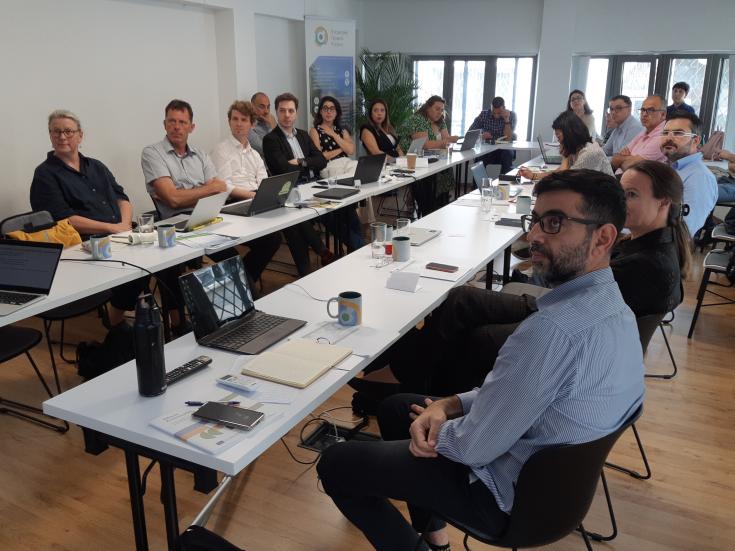Fast tracking Renewable Energy Communities in the Cypriot context

On 23 and 24 May 2023, the Policy Learning Platform organised an on-site peer review for the benefit of the Cyprus Energy Agency on the topic of Fast tracking Renewable Energy Communities (RECs).
Peers from across Europe
Alongside our Thematic experts Katharina Krell and Astrid Severin, four excellent peers participated in the peer review:
- Marcel Schweitzer, Austrian Energy Agency, Austria
- Benjamin Dannemann, German National Office for Energy Cooperatives, Germany
- Karel Dervaux, Ecopower & RESCOOP, Belgium
- Dimitri Vedel, Bodensee-Stiftung (Lake Constance Foundation), Germany
Recommendations
From the outset, the conditions are favourable for the emergence of the first Renewable Energy Communities (RECs) in Cyprus: Cyprus has plenty of RE potential, especially solar; energy prices are rather high.
CEA and the Union of Cyprus Communities are keen to support RECs as means to create added value for the locals and help implement a decentralised and inclusive local energy transition. A focus area for RECs should be rural areas with high percentage of energy poverty.
However, RECs are still new to Cyprus, the energy system is dominated by incumbent players and powered up to 95% with fossil fuels. Big insecurity persists about the legal framework conditions for RECs as Cyprus has not yet detailed the regulatory framework for RECs. Perceived barriers also relate to grid capacity, low HR capacity in local authorities, low citizen awareness for RECs and challenging land use rights.
-
Local authorities can benefit from REC in many ways: to reduce the local carbon footprint, for energy autonomy, to reduce energy bills for citizens and address rural energy poverty, to deepen local value creation and retention and thus foster acceptance through participation in the energy transition.
-
Local authorities are natural allies for local RECs and have an important role to kickstart them. They can notably assign sites for REC projects (roofs of public buildings, parking sites, social housing and land). They can buy the green electricity produced by the REC, select decarbonization zones, apply and participate in EU funded and national low-carbon projects, ensure the direct link with national government and energy agencies, use their local development plans and land zoning for RES and mobilise local stakeholders.
-
They can express political support for citizen-owned energy assets and RECs through their communication channels and set local targets
-
They can facilitate the creation of a community by reach out to the community and help to mobilise stakeholders, offer meeting rooms and work spaces for new RECs.
-
Local authorities can use the power of tendering e.g. to develop a RE project in its territory. As part of the local energy strategy (SECAP), the local authorities can plan for the RE projects they would like to see developed on their territory. The local authority can request in the tender specifications that the project includes citizen participation and local ownership. The local authority can introduce a scoring system that remunerates the tenderers for citizen participation.
-
The energy agency could be the main facilitator between all stakeholders, public and private, concerned
-
It should build technical expertise and be the repository of all available tools and support material
-
It should acquire/receive extra resources as a go-to point for expertise on RECs and roadmap provider for each individual project.
-
As project initiator/communicator it can identify pilot village / community, help set up new RECs and help set up RES projects for RECs.
-
It should also provide support with participatory processes and communication material that can be used by all for awareness raising.
-
It can access EU funding to support REC deployment.
-
RECs should not be seen as adding problems to an already saturated grid. RECs can help keep electricity generation and consumption at local level (on the low-voltage grid), following the Austrian model.
-
RECs are a tool to help the grid cope with the future high RE share in the energy mix
-
Smart meter roll-out is helping grid operator cope with RES in the mix: it gives information and allows grid management
-
RECs and DSOs should not be positioned as adversaries but as potential partners.
Follow-up report
Find all recommendations in the follow-up report below.
Peer review report on fast-tracking Renewable Energy Communities in the Cypriot context
Discover the recommendations of the peer review on fast-tracking Renewable Energy Communities in the Cypriot context
Apply for a peer review!
Submit your peer review application today and find solutions to your policy challenge with our experts and peers!

